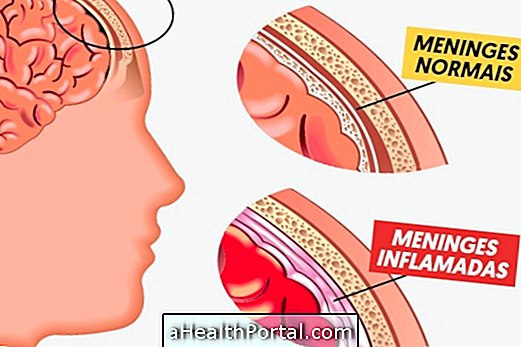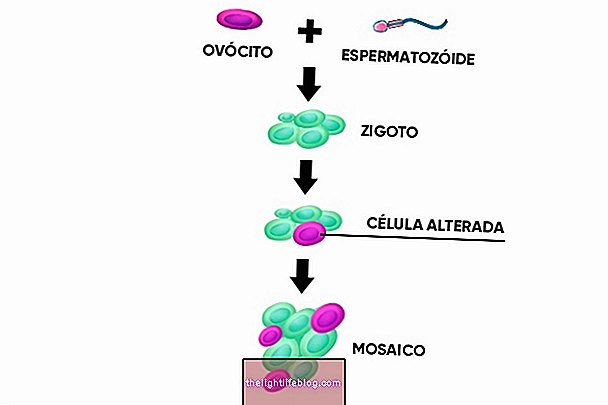The Accelerated Thought Syndrome is an alteration, identified by Augusto Cury, where the mind is full of thoughts, being completely full throughout the time that the person is awake, which makes concentration difficult, increases anxiety and depletes physical health and mental.
Thus, the problem of this syndrome is not related to the content of thoughts, which are usually interesting, cultured and positive, but rather to their quantity and the speed with which they occur within the brain.
Usually, this syndrome occurs in people who need to be constantly attentive, productive and under pressure and, therefore, it is common in executives, health professionals, writers, teachers and journalists. However, it has been observed that even children have demonstrated this syndrome.

Main symptoms
The key features of a person with accelerated thinking syndrome include:
- Anxiety;
- Difficulty concentrating;
- Have small memory laps frequently;
- Excessive tiredness;
- Difficulty getting to sleep;
- Easy irritability;
- Can not get enough rest and wake up tired;
- Restlessness;
- Intolerance of being contradicted;
- Sudden mood swings;
- Constant dissatisfaction;
- Psychosomatic symptoms like: headache, in the muscles, hair loss and gastritis, for example.
In addition, it is also common to feel that 24 hours a day are not enough to do everything you want.
These symptoms are common in students who spend many hours of their day in the classroom and workers who live under pressure always in search of better results and to be recognized as the best in their line of work.
This syndrome has become increasingly common because the amount of stimuli and information available in newspapers, magazines, television, social networks and smarthphones are very large, and bombard the brain with information at all times. The result of this is that in addition to having a lot of information in the mind, thinking has become more and more accelerated, being more difficult to manage the emotions associated with each situation.
See 7 Tips to Control Anxiety and Live Better
How is the diagnosis made?
The diagnosis of this syndrome is made by the psychologist or psychoanalyst based on the symptoms and history reports that the person presents, but the person can also respond to a questionnaire to help identify this syndrome faster.
How to treat Accelerated Thought Syndrome
Treatment for Accelerated Thought Syndrome should be directed by a specialist such as a psychologist or psychiatrist. But it is usually done with the adaptation of the habits of life, should be to include several pauses during the day, to do frequent physical activity or to include small moments to listen to music or to read a book without thinking about other activities.
It is also advisable to avoid long working hours, doing work-related tasks only during working hours, and taking short-term holidays more often. A good tip is instead of taking a month off, the person can take 4 or 5 days off every 4 months because that way there is more time to rest and turn off the mind of the tasks of work and study.
Here are some tips on how to fight stress and relax after work.

More indicated remedies
Medications that may be indicated by the psychiatrist to help manage the Thought-Thought Syndrome are anxiety-fighting anxiolytics and antidepressants if there is associated depression.
But only the use of medication is not enough and therefore it is necessary to consult regularly with the psychotherapist so that the person can know how to manage their emotions and control the thoughts more efficiently. There are a number of strategies that psychologists and psychiatrists can use to reach this goal, but some tips that can help the person keep thoughts and emotions more controlled are listed below.
Tips to combat this syndrome
- Study or work with relaxing ambient music, at a low volume, but enough to be heard and appreciated. Nature sounds and classical music are good examples of musical styles that increase concentration and bring a sense of peace and serenity to the mind;
- Separate up to 3 times of the day to enter social networks, not always be online, or enter social networks every 5 minutes to avoid excessive information and stimuli in the mind during the day;
- When talking personally with friends expose feelings and tell about their victories and defeats because it humanizes relationships and makes them stronger and resilient, being more appreciated than virtual reality, which can imprison the mind.
How Does This Syndrome Affect Your Health
The accelerated thinking syndrome is very damaging to the mind because it hinders the development of essential abilities like creativity, innovation, reflection and even the will to continue trying, without giving up, generating chronic anxiety and prolonged dissatisfaction.
In addition, in this syndrome the brain blocks the memory frequently to be able to think less and save more energy, which is why frequent memory lapses are also due to the fact that the brain expends the energies reserved for the muscles, causing an excessive sensation of physical and emotional tiredness.
The person with the accelerated-thinking syndrome has difficulty putting himself in the other's shoes and does not accept suggestions, imposes his ideas constantly, and has difficulty reflecting before acting. It also presents more difficulty in dealing with losses and recognizing their mistakes by reflecting on them.























